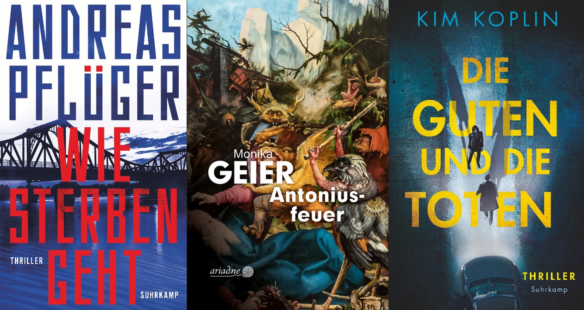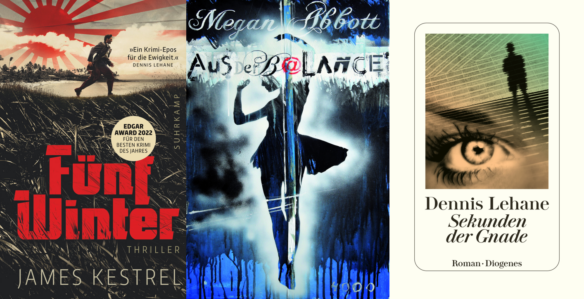The winners of the Deutscher Krimipreis 2023 have been announced. (Translations by Cora Buhlert.)

NATIONAL
[Original German language crime fiction]
1st Place: Wie Sterben geht (How Dying Works) by Andreas Pflüger, Publisher: Suhrkamp
Winter 1983. At Glienicke Bridge in Berlin, everything is ready for the most spectacular agent exchange in history. KGB officer Rem Kukura – codename Pilgrim – is supposed to be exchanged against the son of politbureau member. Caught up in the middle: Nina Winter, the only person who can identify Kukura. However, on the bridge Nina is plunged into an inferno, as her and Rem’s fate becomes a question of war and peace between the two superpowers.
2nd Place: Antoniusfeuer (St. Anthony’s Fire) by Monika Geier, Publisher: Ariadne/Argument
Detective inspector Bettina Boll is used to annoyances, but the latest order by her department leaves a bitter aftertaste. A death in juvenile detention has to be investigated, officials fear a scandal and Bettina is supposed to take the heat off her new boss and interfere with a colleague’s investigation. Moreover, the case turns out to be extremely bizarre. Are there really Catholic village activists who exorcise demons? And what does the famous Isenheim altar with its many colourful monsters and demons have to do with the case?
3rd Place: Die Guten und die Toten (The Good and the Dead) by Kim Koplin, Publisher: Suhrkamp
Saad and his little daughter Leila live off the grid in Berlin. Saad earns his living as a watchman in a parking garage in the Charlottenburg neighbourhood, working the nightshift for good reason. Parked in this garage is the luxury limousine of state secretary Brasch who is involved in nasty business deals with arms dealer Müller and shady Saudis. When Brasch causes an accident, while drunk and high on cocaine, and a body is discovered in the trunk of his car – much to Brasch’s surprise – the young female detective inspector Nihal Khigarian takes the case.

INTERNATIONAL
[Crime fiction translated into German]
1st Place: Fünf Winter (Five Decembers) by James Kestrel, translated by Stefan Lux, Publisher: Suhrkamp [Winner of the 2022 Edgar Award for Best Novel]
December 1941. America teeters on the brink of war, and in Honolulu, Hawaii, police detective Joe McGrady is assigned to investigate a homicide that will change his life forever. Because the trail of murder he uncovers will lead him across the Pacific, far from home and the woman he loves; and though the U.S. doesn’t know it yet, a Japanese fleet is already steaming toward Pearl Harbor.
This extraordinary novel is so much more than just a gripping crime story—it’s a story of survival against all odds, of love and loss and the human cost of war. Spanning the entirety of World War II, Five Decembers is a beautiful, masterful, powerful novel that will live in your memory forever.
2nd Place: Aus der Balance (The Turnout) by Megan Abbott, translated by Karen Gerwig and Angelika Müller, Publisher: Pulp Master
With their long necks and matching buns and pink tights, Dara and Marie Durant have been dancers since they can remember. Growing up, they were homeschooled and trained by their glamorous mother, founder of the Durant School of Dance. After their parents’ death in a tragic accident nearly a dozen years ago, the sisters began running the school together, along with Charlie, Dara’s husband and once their mother’s prized student.
Marie, warm and soft, teaches the younger students; Dara, with her precision, trains the older ones; and Charlie, sidelined from dancing after years of injuries, rules over the back office. Circling around one another, the three have perfected a dance, six days a week, that keeps the studio thriving. But when a suspicious accident occurs, just at the onset of the school’s annual performance of The Nutcracker—a season of competition, anxiety, and exhilaration—an interloper arrives and threatens the sisters’ delicate balance.
Taut and unnerving, The Turnout is Megan Abbott at the height of her game. With uncanny insight and hypnotic writing, it is a sharp and strange dissection of family ties and sexuality, femininity and power, and a tale that is both alarming and irresistible.
3rd Place: Sekunden der Gnade (Small Mercies) by Dennis Lehane, translated by Malte Krutzsch, Publisher: Diogenes
In the summer of 1974 a heatwave blankets Boston and Mary Pat Fennessy is trying to stay one step ahead of the bill collectors. Mary Pat has lived her entire life in the housing projects of “Southie,” the Irish American enclave that stubbornly adheres to old tradition and stands proudly apart.
One night Mary Pat’s teenage daughter Jules stays out late and doesn’t come home. That same evening, a young Black man is found dead, struck by a subway train under mysterious circumstances.
The two events seem unconnected. But Mary Pat, propelled by a desperate search for her missing daughter, begins turning over stones best left untouched—asking questions that bother Marty Butler, chieftain of the Irish mob, and the men who work for him, men who don’t take kindly to any threat to their business.
Set against the hot, tumultuous months when the city’s desegregation of its public schools exploded in violence, Small Mercies is a superb thriller, a brutal depiction of criminality and power, and an unflinching portrait of the dark heart of American racism. It is a mesmerizing and wrenching work that only Dennis Lehane could write.
Discover more from File 770
Subscribe to get the latest posts to your email.

Five Decembers is very good BTW.
I shall also be on the look-out for Andreas Pflüger’s novel.
Glienicke Bridge is open to the public BTW and has been since November 9, 1989. It’s a standard pre-WWII steel bridge construction, though there is a thrill at crossing the bridge that only unsuccessful spies could once cross.
I also remember that when all the Berlin border crossing opened one by one in the night from November 9 to November 10, the ones that excited West Berliners most was – aside from the Brandenburg Gate – Glienicke Bridge, because you literally couldn’t go there, unless you were a spy who’d been caught.
Nearby Glienicke Palace is nice BTW and has some very pretty gardens.
BTW, when I was last in Berlin, I ran into some American tourists who were standing on Schlossbrücke in the city center and wonder whether that was the famous Bridge of Spies.
I told them, “No, this is Schlossbrücke and it was never on the border. The one you want is Glienicke Bridge and it’s on the outskirts of the city.